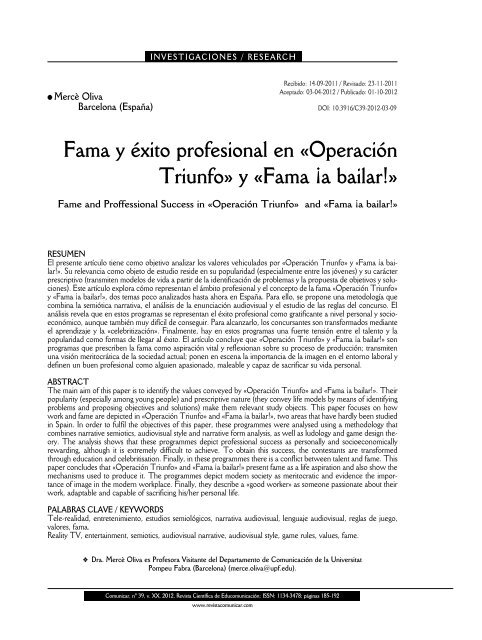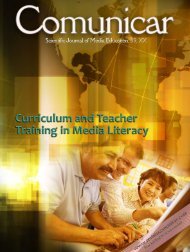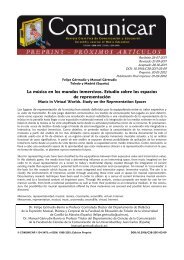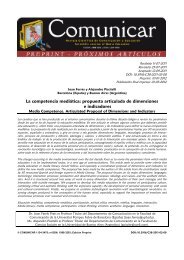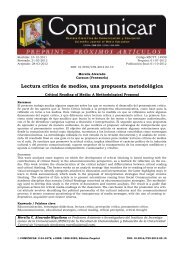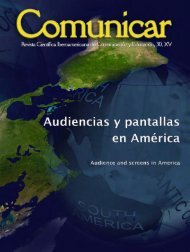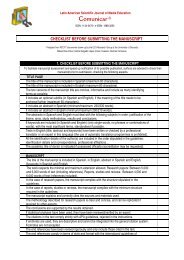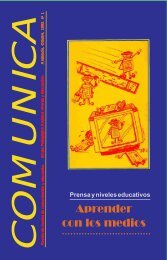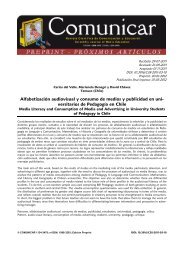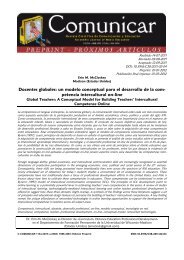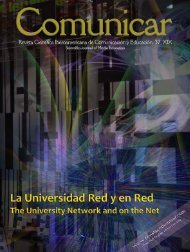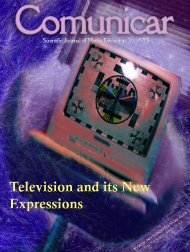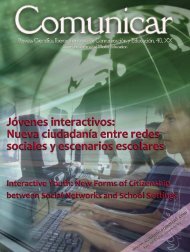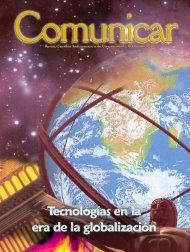Comunicar 39 - Revista Comunicar
Comunicar 39 - Revista Comunicar
Comunicar 39 - Revista Comunicar
You also want an ePaper? Increase the reach of your titles
YUMPU automatically turns print PDFs into web optimized ePapers that Google loves.
INVESTIGACIONES / RESEARCH<br />
l Mercè Oliva<br />
Barcelona (España)<br />
Recibido: 14-09-2011 / Revisado: 23-11-2011<br />
Aceptado: 03-04-2012 / Publicado: 01-10-2012<br />
DOI: 10.<strong>39</strong>16/C<strong>39</strong>-2012-03-09<br />
Fama y éxito profesional en «Operación<br />
Triunfo» y «Fama ¡a bailar!»<br />
Fame and Proffessional Success in «Operación Triunfo» and «Fama ¡a bailar!»<br />
RESUMEN<br />
El presente artículo tiene como objetivo analizar los valores vehiculados por «Operación Triunfo» y «Fama ¡a bailar!».<br />
Su relevancia como objeto de estudio reside en su popularidad (especialmente entre los jóvenes) y su carácter<br />
prescriptivo (transmiten modelos de vida a partir de la identificación de problemas y la propuesta de objetivos y soluciones).<br />
Este artículo explora cómo representan el ámbito profesional y el concepto de la fama «Operación Triunfo»<br />
y «Fama ¡a bailar!», dos temas poco analizados hasta ahora en España. Para ello, se propone una metodología que<br />
combina la semiótica narrativa, el análisis de la enunciación audiovisual y el estudio de las reglas del concurso. El<br />
análisis revela que en estos programas se representan el éxito profesional como gratificante a nivel personal y socioeconómico,<br />
aunque también muy difícil de conseguir. Para alcanzarlo, los concursantes son transformados mediante<br />
el aprendizaje y la «celebritización». Finalmente, hay en estos programas una fuerte tensión entre el talento y la<br />
popularidad como formas de llegar al éxito. El artículo concluye que «Operación Triunfo» y «Fama ¡a bailar!» son<br />
programas que prescriben la fama como aspiración vital y reflexionan sobre su proceso de producción; transmiten<br />
una visión meritocrática de la sociedad actual; ponen en escena la importancia de la imagen en el entorno laboral y<br />
definen un buen profesional como alguien apasionado, maleable y capaz de sacrificar su vida personal.<br />
ABSTRACT<br />
The main aim of this paper is to identify the values conveyed by «Operación Triunfo» and «Fama ¡a bailar!». Their<br />
popularity (especially among young people) and prescriptive nature (they convey life models by means of identifying<br />
problems and proposing objectives and solutions) make them relevant study objects. This paper focuses on how<br />
work and fame are depicted in «Operación Triunfo» and «Fama ¡a bailar!», two areas that have hardly been studied<br />
in Spain. In order to fulfil the objectives of this paper, these programmes were analysed using a methodology that<br />
combines narrative semiotics, audiovisual style and narrative form analysis, as well as ludology and game design theory.<br />
The analysis shows that these programmes depict professional success as personally and socioeconomically<br />
rewarding, although it is extremely difficult to achieve. To obtain this success, the contestants are transformed<br />
through education and celebritisation. Finally, in these programmes there is a conflict between talent and fame. This<br />
paper concludes that «Operación Triunfo» and «Fama ¡a bailar!» present fame as a life aspiration and also show the<br />
mechanisms used to produce it. The programmes depict modern society as meritocratic and evidence the impor -<br />
tance of image in the modern workplace. Finally, they describe a «good worker» as someone passionate about their<br />
work, adaptable and capable of sacrificing his/her personal life.<br />
PALABRAS CLAVE / KEYWORDS<br />
Tele-realidad, entretenimiento, estudios semiológicos, narrativa audiovisual, lenguaje audiovisual, reglas de juego,<br />
valores, fama.<br />
Reality TV, entertainment, semiotics, audiovisual narrative, audiovisual style, game rules, values, fame.<br />
v Dra. Mercè Oliva es Profesora Visitante del Departamento de Comunicación de la Universitat<br />
Pompeu Fabra (Barcelona) (merce.oliva@upf.edu).<br />
<strong>Comunicar</strong>, nº <strong>39</strong>, v. XX, 2012, <strong>Revista</strong> Científica de Educomunicación; ISSN: 1134-3478; páginas 185-192<br />
www.revistacomunicar.com


